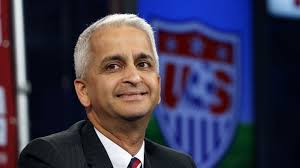By Ben Nicholson
September 3 – The North American Soccer League (NASL) is challenging the legality of the United States Soccer Federation’s (USSF) criteria change to Division 1 sanctioning. The new requirements allegedly serve as a “bait and switch” that gives preferential treatment to Major League Soccer (MLS) in violation of antitrust laws, which are laws that regulate the conduct and organisation of business corporations that seek to promote fair competition.
The USSF is solely responsible for sanctioning professional soccer leagues. As there is no promotion/relegation structure in US Soccer, the quality of a league is performativity evaluated by USSF’s status recognition.
USSF has three divisions for outdoor leagues. Separating which division a league falls into are factors including the amount of teams in the league, the size of the metropolitan markets in which the teams compete, the size and nature of the stadiums in which the teams compete and the financial viability of the league.
As it stands, the MLS is the only league with Division 1 status, the NASL is the only league with Division 2 status and the United Soccer League (USL) is the only league with Division 3 status.
In January of 2015 the NASL applied for Division 1 status, but the application is on hold. The USL is reportedly seeking Division 2 sanctioning, in hope of standing side-by-side with the NASL.
At issue are USSF’s proposed changes to increase the requisite amount of teams for Division 1 status to 16, of which 75% need to be based in cities with more than two million people.
The previous guideline stipulated that the league must have a minimum of 12 teams and a minimum of 14 teams by its third year of existence. The metropolitan market size minimum was half of that which is newly proposed, standing at the mere one million mark.
There would be no change to Division 2 or Division 3 sanctioning requirements, which is helping to fuel NASL’s theory that they are being singled out for harmful treatment. Abetting this theory is the fact that the USSF has MLS representatives on its Board of Directors but no NASL representatives.
The NASL carries just 11 teams, with two expansion franchises in the making for 2016. Of those teams, only two have stadiums that could meet the 15,000 capacity requirements for Division 1 accreditation.
Sports attorney Jeffrey Kessler, who represents the NASL, wrote a letter to USSF president Sunil Gulati (pictured) and secretary general Daniel Flynn, saying: “Doubling the population criteria now is an anticompetitive bait and switch, with the purpose of entrenching MLS’s monopoly position at the very time when the NASL is threatening to become a serious competitor.”
Kessler attempted to exemplify the unreasonableness of the new standard by highlighting that the National Hockey League, a significantly more culturally established North American sport, would not be to attain Division 1 status.
Beyond the facial degradation of being deemed something other than a Division 1 league, the NASL suffers financially from the lower gradation.
Kessler wrote: “The financial damage is significant. Simply put, the actions by US Soccer are hindering the league’s earnings potential with advertisers, broadcasters and other business partners, who will pay top dollar only for Division I, regardless of the quality of play or passion of the fans.”
Currently, the MLS has TV deals with Fox Sports and ESPN while the NASL only gets the occasional coverage on ESPN’s online platform ESPN3. This disparity would likely only be accentuated if NASL’s prospects of becoming a Division 1 recognised league is diminished further.
There has been speculation that the NASL would struggle to get their lawsuit off the ground but instead could use the threat of legal action in order to mount pressure for the creation of a promotion/relegation structure.
The NASL has suffered reputational damage in the recent wake of the revelation of corruption at CONCACAF. The league was closely linked to the sports marketing firm, Traffic, that stand accused of misconduct and corruption in respect to the acquisition of commercial rights. Former NASL chairman, Aaron Davidson, was one of the defendants charged in the FIFA indictment and is currently on bail awaiting trial.
Contact the writer of this story at moc.l1744972875labto1744972875ofdlr1744972875owedi1744972875sni@n1744972875osloh1744972875cin.n1744972875eb1744972875

